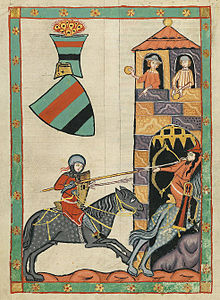Kristan von Luppin

Kristan (Christan) von Luppin was a German minstrel who is attested around the turn of the 13th to the 14th century.
Life
Kristan von Luppin is documented between 1292 and 1313. The Luppiners belonged to the "milites et servi" of the Counts of Beichlingen on the Rothenburg in the Kyffhäuser Mountains . The writer in the Große Heidelberger Liederhandschrift therefore probably saw Kristan as an owner of his own , as he withheld the nobility predicate "Herr" from his name. However, he added the attribute "a Düring" to it.
According to tradition, the young minstrel fell in love with his master's daughter, Countess Sofie. He wrote for her:
You pure one, oh you beautiful one, dearest you,
you wonderful woman, only you,
only you alone are my peace.
Your light body always remains so dear and fine to
me ,
and probably never
anything more beautiful was known to me
than your sweet red mouth.
She is said to have cursed him and in that of Friedrich III. In 1251 he entered the nunnery in Kelbra.
He later entered the service of Margrave Heinrich I of Brandenburg-Langberg. At the end of his life he was a Burgmann in Sangerhausen. His brothers Ehrenfried and Friedrich are also mentioned in a document in connection with the Rothenburg .
plant
The miniature of the Codex Manesse shows a knight chasing after a maliciously caricatured enemy, perhaps a kind of crusade propaganda that has nothing to do with Kristan's songs.
Kristan's seven songs handed down in the Codex Manesse, influenced by the motifs of those of Heinrich von Morungen , his famous predecessor from the other side of the Golden Aue , comprise, with one exception, three stanzas. With them, Kristan fulfills the minned service scheme, in keeping with the style of his time: praise the mistress, lament for love and desire to be heard. Accordingly, Kristan's mistress proves to be as tempting as she is aloof, and the minstrel dutifully praises her beauty and moral integrity. Kristan overwrites these time-bound topoi in his texts, sometimes with passionate emphasis, sometimes with jokes and irony. His spokesman would gladly leave the honorable ladies in the hereafter to God, and he hopes that the mistress will give him absolution for his transgressions by making him atone with a thousand kisses.
This double tone is supported by artful rhyming games, such as in song II, in which Kristan combines the grains, that is, the inconsistent verses of the first and second stanzas, to the desired sentence: "a munt rœter danne rôt" / "mir wær nœter danne nôt" to which the mistress inexorably replies in the third stanza with “die he tœter then tôt” . The seven songs represent a small cycle: the “Yes” implored by the mistress in song I and the imploringly demanded “Yes! Yes! Yes! ”In the final stanza of the last text, the songs add to a wish ring.
expenditure
All of Kristan's songs in:
- Codex Manesse. The Great Heidelberg Song Manuscript, sheet 226 a. 227; Codex Palatinus Germanicus 848 of the Heidelberg University Library. Full facsimile in 12 partial deliveries, with interim texts by Ingo F. Walther. Frankfurt a. M. 1975-1988
- "The Great Heidelberg Song Manuscript". Edited by Fridrich Pfaff in a true print of the text . Second, improved and supplemented edition edited by Hellmut Salowski, Heidelberg 1984
- Carl von Kraus (Ed.): German song poets of the 13th century, Volume I: Text, Volume II: Commentary, provided by Hugo Kuhn . Second edition, Tübingen 1978
- Gerhard Tänzer (ed.): "Frouwe, frouwe, frouwe mîn!" Thuringian Minnelieder. Text, transmission, comment . Bucha near Jena 2005
literature
- Detlef Goller: Kristan von Luppin. Court servants and minstrels . In: Seidel; Solms (ed.): Dô tacte ez. German literature of the Middle Ages in Saxony-Anhalt . Dössel 2003, pp. 89-96.
- Fritz Grimme: The Minnesinger Kristân von Lupine and his relationship with Heinrich von Morungen . Diss. Münster, printed by Heiligenstadt 1885
- Manfred Günter Scholz: Lupine, Christian von. In: New German Biography (NDB). Volume 15, Duncker & Humblot, Berlin 1987, ISBN 3-428-00196-6 , p. 523 ( digitized version ).
- Ingo F. Walther (Ed.): Codex Manesse. The miniatures of the Great Heidelberg Song Manuscript . Frankfurt a. M. 1988
- Wilhelm Wilmanns: Lupine, Christian von . In: Allgemeine Deutsche Biographie (ADB). Volume 19, Duncker & Humblot, Leipzig 1884, p. 646.
- FJ Worstbrock: Christan von Luppin . In: Kurt Ruh et al. (Ed.): The German literature of the Middle Ages. Author Lexicon . 2nd Edition. De Gruyter, part 1. Berlin 1978, col. 1208 f.
Web links
Individual evidence
- ↑ Ewald Engelhard: The Kyffhäuser Mountains - Its natural and cultural history. Verlag C. Werneburg, Bad Frankenhausen, 1930, p. 28
- ↑ Ewald Engelhard: The Kyffhäuser Mountains - Its natural and cultural history. Verlag C. Werneburg, Bad Frankenhausen, 1930, p. 27
| personal data | |
|---|---|
| SURNAME | Kristan von Luppin |
| ALTERNATIVE NAMES | Kristian von Lupine; Christan von Luppin |
| BRIEF DESCRIPTION | German minstrel |
| DATE OF BIRTH | 13th Century |
| DATE OF DEATH | 14th Century |